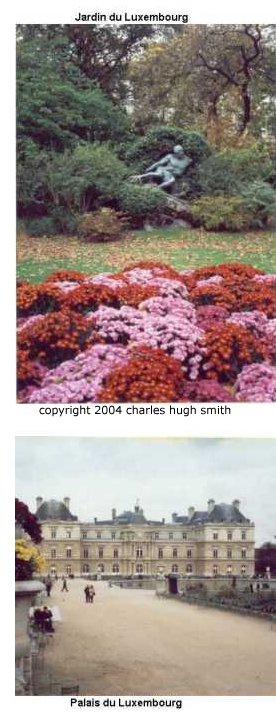

|
| weblog/wEssays | home | |
|
On Hatred and Anti-Americanism, Part II (December 10, 2005)  The French are not alone, of course, in projecting fears onto an
external enemy. Americans too have suffered from their own irrational
villifications based on fear: the shameful history of rabid anti-Communist
hysteria in the 50s or the many waves of anti-immigrant fervor are just two examples that
come to mind.
The French are not alone, of course, in projecting fears onto an
external enemy. Americans too have suffered from their own irrational
villifications based on fear: the shameful history of rabid anti-Communist
hysteria in the 50s or the many waves of anti-immigrant fervor are just two examples that
come to mind.
But France's obstructionist view of America has roots which seem to outlast typical cycles of externalized national insecurities. The review cited in yesterday's entry locates the start of France's outrage in America's 1794 peace treay with Britain, but certainly France's post-war flirtations with the Soviet Union and disgust with the U.S. has other more recent roots. The article cites two potential root causes: America's enormous sacrifices on France's behalf in the World Wars created debts which, being unpayable, have bred the natural resentment of the debtor; and secondly, that World War I so bled France that its people have since been unwilling to resort to armed force. Yes, the French put up a keen fight against the Nazis, but while the debacle of 1940 was undoubtedly based on the incompetence of political and military leaders, there was apparently a general air of defeat in the air long before the first shot was fired. This has been carefully described by William L. Shirer in The Collapse of the Third Republic: An Inquiry into the Fall of France in 1940 This unwillingness to use force even when there is reasonable cause--Shirer claims that the French Army, overwhelmingly superior to German forces in 1938, could have snuffed Nazism in a matter of days when Hitler made his first limited landgrab that year--has led the French, and indeed the E.U. as a whole, to a seemingly permanent reliance on diplomacy as the only tool available in international conflicts. This is all well and good when you're negotiating with other leaders of good faith, but when faced with a leader like Saddam or Stalin or Miloslavic who views negotiation solely as an opportunity to exploit the weak-willed and trusting--diplomacy has limited reach. Thus we have a France which appeared more tolerant or sympathetic to the Soviet Empire of Gulags and repression, Serbian hooligans, Castro's police state, Saddam's regime, etc.--than with American resolve. The ineffectiveness of their status only fuels their resentment of American power, it seems, for the willingness to maintain and use force gives the U.S. leverage the French or the E.U., with their limited militaries and staunch disavowal of force, will never wield. Even as ethnic cleansing, mass rape and murder were being committed by Serbians on the European continent, the Western European "powers" dithered and prevaricated, trying fruitlessly to "negotiate" with a leader who had every reason to exploit their weakness. Finally, the U.S. forced NATO into a pathetic, flaccid bombing "campaign" (two aircraft, four bombs) which only emboldened the Serbian perpetrators of genocide. At long last, as the innocent victims piled up in untold thousands like so much cordwood did the U.S. override the European fear of force and bomb the Serbian killers with the intent to break their will. Despite all the European handwringing and all the absurd limitations placed on NATO commanders, a few weeks of "bringing the war home" to the Serbians did in fact bring the Serbian genocidal reign of terror to an end--years later than circumstances warranted, and only after tens of thousands of unarmed civilians were slaughtered, raped and imprisoned. This is what the E.U. reliance on pure diplomacy wrought; the needless death of thousands. Thus we welcome a French reappraisal of that nation's views of America, along with a reappraisal of their own failures, limitations and weaknesses--problems which have been so graphically highlighted by the thousands of torched vehicles lighting the smoke-darkened skies of the Parisian Banlieus. * * * copyright © 2005 Charles Hugh Smith. All rights reserved in all media. I would be honored if you linked this wEssay to your site, or printed a copy for your own use. * * * |
||
| weblog/wEssays | home |